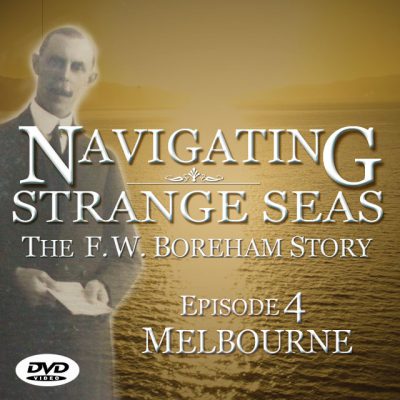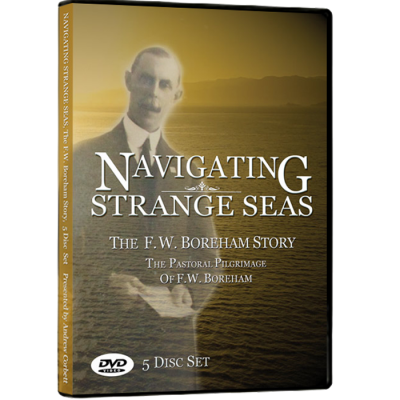
Home > FWB Books > The Silver Shadow > John Havelock’s Escape
III
JOHN HAVELOCK’S ESCAPE
I
John Havelock was a giant by nature, a gentleman by instinct, a Christian by the grace of God, and a grocer by profession. I lay stress, at the very outset, upon this fourth dimension, because it is with John as a grocer that I am now principally concerned. John was a tremendous fellow. His huge form seems to tower up before me even as I write. I am not much short of six feet myself; but I felt a perfect pigmy when he was about. And he was usually about. For John was for twelve years one of my deacons, and no minister could have had a more staunch and faithful friend. When John first came to Mosgiel, he carried his entire stock-in-trade upon his big, broad back. Like a modern edition of Atlas bearing the earth upon his shoulders, John came over the hills supporting an enormous pack, beneath the weight of which even his titanic frame almost staggered. He hawked his groceries from door to door. People liked his pluck and admired his enterprise — he was scarcely more than a boy in those days. He rapidly built up a connexion. In a few months he was able to buy a pony and cart; then he opened a shop ; and, within ten years, he owned the biggest store on the Taieri Plain. As a grocer, John was a phenomenal success; yet, oddly enough, John was not always content to be a grocer. During one brief phase of his eventful career he hankered after the ministry. And it is the story of his escape from such a catastrophe that I have set out to record. Some men are made to be ministers; some are not made to be ministers; some are made not to be ministers. John Havelock belonged to this third class. He was as honest as the day, and his transparent honesty was the secret of his success as a grocer. But he was handicapped by defects that proclaimed to all who knew him his irremediable unfitness for the ministry. To begin with, he could not express himself. In ordinary conversation I have seen him waving his hands like signals of distress whilst he struggled vainly to think of the word he wanted. I have heard it said of some men that they speak as though they have swallowed a dictionary. John must certainly have swallowed his, for he could never find a word when he wanted it. He would hum and ha, stutter and gesticulate, pull all kinds of grimaces, and express astonishment at the obstinacy of the elusive phrase; but the truant word took no notice of his frantic behaviour; it would never come.
II
Nor am I convinced that he possessed some of those deeper qualities that go to make up a really successful minister. He was too much of an idealist. He liked bad people, and would have laid down his life to save them. He liked good people, and would have gone to any trouble to serve them; but that was about all. He never realized that he was living in a world in which very few people are altogether bad or altogether good. Most people are half and half, and it is a minister’s business to take people as he finds them and make the best he can of them. John could never do that. Had he become a minister, and had one member of his flock gone astray, John would have been like the good shepherd of the Gospels. He would have left everything, and would have gone out into the wilderness, and would have searched for that which was lost until he found it. And, when he had found it, he would have brought it back to the fold rejoicing. Such an experience would have been like a foretaste of heaven to John. And then again he would have revelled in the company of good people. But no very great proportion of a minister’s life is spent either with the sheep that go hopelessly astray or with the sheep that remain demurely in the fold. Each of the ninety and nine sheep which go not astray has some little sheepish obstinacies that have to be watched, and some little sheepish stupidities that have to be endured, and some little sheepish peculiarities that have to be studied ; and John would have been all at sea in this realm of things. He loved bad men and good men, but he had no patience with anything betwixt and between. He was an idealist. In some ways he was too good to make a successful minister.
III
John often told me the story of his escape. He always told it to the accompaniment of a storm of laughter ; but you could feel that tears were not far away. The lure of the pulpit arose very largely from John’s unbounded admiration of the minister of his boyhood, the Rev. Alfred South. He regarded his old minister as the incarnation of all human nobleness ; and the excellence of the man threw a new lustre, in John’s eyes, about his sacred calling. To be a minister seemed to John the very climax of human greatness, the loftiest altitude of moral grandeur. The very thought of it captivated his whole fancy. It haunted his waking imaginations and wove itself into his night-time dreams. The idea was a for long time purely impersonal He did not connect himself with it in any way. It was just the abstract thought of being a minister, the sublimity of being a minister! But at length he found his own face creeping into the vision. At first he dismissed the thought with horror. He drove it away impatiently, as he would have brushed away a fly that threatened to settle on a sacred and beautiful picture. But it came back again and again in spite of him. At last his own face became part of the vision. He could not exclude it. And then he asked himself if he ought any longer to try to exclude it? Might not this be to him a solemn and imperative call ? This was the struggle that was proceeding in his soul whilst his body was aching under the burden of the great pack that he bore so bravely over the hills. John had a conscience as tender as a baby’s finger-tips. Climbing a steep hill one day, he thought all the way up of Jonah. Jonah heard the call, and fled. John trembled lest he too should prove recreant to a divine commission. And all the way down the opposite slope, where the mountain range inclines to the plain below, he thought of Paul. ‘I was not disobedient to the heavenly vision.’ He came into the town and began selling his groceries. But every shilling seemed to burn his pockets. He felt that he had heard a higher voice and flouted it. He had been commanded to forsake all and follow like the disciples of old, and yet here he was, hugging his pack and making his profits still!
IV
A fortnight later the position became intolerable and a crisis was precipitated. John could not sleep at night; he tossed to and fro in a fever of uncertainty and cruel doubt. And all day long his mind was focused upon his inner struggle rather than upon his groceries. lie made mistakes; gave customers goods for which they had not asked, and returned them too much change. Twice in one day he was charged with being in love. He could not truthfully deny the soft impeachment, for it was perfectly true; and his affection for Kit only increased his anxiety to make no false step. She was a wise little woman. The prospect of being the mistress of a manse was as sweet to her as John’s radiant dreams of the ministry were to him. But love had not blinded her eyes to his defects. She would rather see him a successful merchant and an honoured citizen than see him a failure in the ministry. She, therefore, feigned indifference concerning the change at which he hinted, but spoke proudly of his present success in business, and of the good they would be able to do if, some day, fortune came their way. Yes, John was in love; but Kit was not to blame for the blunders that he made that day.
That night when John reached home, sick at heart and tired out, a letter awaited him. It was from the secretary of the church, asking him to conduct a cottage prayer-meeting at a certain home on the following Thursday evening. John seized a pen; scribbled off a reply, agreeing to conduct the service ; and went out to post it. It was a lovely night, mild and starlit. It was late, and there was not a soul about. John had not troubled to put on his hat, and he felt soothed by the cool breeze as it played caressingly with his hair. Suddenly, on the way back from the post, a strange impulse took possession of him. He lifted the panel and let himself into a field at the far end of which some cattle were huddled together. He threw himself on his knees on the grass and, turning his face to the skies, he prayed. ‘O Lord,’ he exclaimed passionately, ‘wouldst Thou have me to be Thy minister? Show me Thy way, O Lord I If it be Thy will that I should take this step, grant me some token of Thy favour as I preach Thy Word on Thursday! Let it be seen that God is with me and that I do but speak in His holy name ! And if not, O Lord! If it be not Thy will that I should be one of Thy ministers, then, I entreat Thee, put me to confusion before all who shall attend! Let it be seen that Thou hast not called me! Pity Thy servant in his distress and vouchsafe to him the sign that he desires!’ John rose ; some cool raindrops fell refreshingly upon his flushed face; he hurried home, threw himself into bed, and slept like a top.
V
‘I shall never forget that Thursday night as long as I live,’ John often said to me. ‘I was determined that, if things went wrong, they should go wrong through no neglect of mine. I chose my text on the Sunday and spent every scrap of spare time preparing my address. I went over it again and again in the course of my rounds. I selected the hymns and practised them most carefully with the lady who was to play the organ. I even arranged with the two men who were to lead us in prayer. I never made such careful preparation for a meeting in my life. Had I been commanded to preach before the King I could not have attended more punctiliously to every detail. Half an hour before the time, I walked down to the house at which the meeting was to be held, and saw to it that the chairs, the table, the lights, and everything else were to my liking. Just after I had taken my place in the arm-chair at the table, Kit entered with her mother and smiled meaningly and sympathetically.
‘At eight o’clock the big room was comfortably filled, and I started to the tick. It seemed as though nothing could go wrong. The singing was hearty ; the prayers were models of reverence and fervour; I read the Scripture amidst a silence that showed that no single listener was willing to miss one precious syllable of the sublime message. The extreme nervousness that had victimized me all day passed from me like a cloud, and I experienced a confidence and self-possession I had rarely known before. At length I announced the hymn that immediately preceded my address. During the singing of the last verse I bowed my head and inwardly repeated the vow that I had uttered under the trees. The people resumed their seats; I rose.
At that moment there was a commotion in the hall outside. A late-comer had arrived. It turned out to be a bustling little old lady of genial face and ample figure who lived just across the road. I paused, waiting for things to settle themselves. There was a shuffling of chairs. A man on the right-hand side of the door was about to place his chair for her when he saw that a man on the left-hand side of the door was offering his. Each started to move his chair, and each withdrew it on discovering the action of the other. The old lady took it for granted that her chair was now in place and sat down! There was a thud ; a score of piercing screams; and then, when it was clear that the good body was none the worse for her prostration, a general burst of laughter. The old lady rose and scolded first the man on the right and then the man on the left; there were apologies and explanations; the company compared notes as to what each saw and heard and thought. There was more laughter after each narration, and the possibilities of restoring solemnity and resuming the meeting vanished into thin air. The carefully prepared address was never delivered ; the prayer under the trees had been answered. When I said ‘Good-night’ to them all, they were laughing good-naturedly. On Kit’s face I saw a look of wistful sadness. Kit saw the tragedy that underlay the comedy. Kit understood.’
VI
John assures me that he went home that night feeling neither discomfited nor ashamed. The issues to him were so momentous that the embarrassment of the situation did not affect him. The other afternoon I saw a naval signalman waving flags to a battleship out at sea. A little child was with me. He thought the flag-waving great fun. The officer on the battleship interpreted the message with grim seriousness. The people gathered that night saw things as my little boy saw the waving of the flags. To John the incident was pregnant with quite another significance. He was like the officer on the ship. He felt, he says, that a great load had been lifted from his shoulders. He threw himself into his business with a will. Nobody ever again accused him of being in love, although he and Kit were married the following year.
As I have said, he prospered phenomenally. Everything that he touched turned to gold. He made a fortune in no time. And it was just as well that he did. For, two years after his marriage, a baby-boy came to John’s home. And, while the place was still ringing with his childish merriment, the little fellow went suddenly blind. Poor John and poor Kit! I was with them constantly in those days, and shall never forget their dumb but terrible anguish. Every morning they hurried to the bedside of their treasure, hoping against hope that the light had come back to Davie’s eyes in the night. Then John made his great resolve. He determined to devote his life and his fortune to the service of his blind boy. Mosgiel was a small place, and there were no institutions there at which he could receive special training. John sold out; and went away to live in retirement near a large School for the Blind nearly a thousand miles away. He spent every moment of his time and every penny of his income in making a man of Davie. And again the most extraordinary success attended him. Davie became one of the most brilliant scholars and one of the most accomplished citizens that the Dominion of New Zealand ever produced.
The last time I saw John he was telling me proudly of Davie’s triumphs. And then his mind harked back to the old days — the heavy pack, the golden dreams, and the never-to-be-forgotten prayer-meeting. ‘I can see now,’ he said, in a voice in which gratitude mingled with a certain indefinable sadness, ‘I can see now that I should have cut a very poor figure in the ministry. And besides,’ he added reflectively, ‘I should never have been able to make a man of Davie. It was a great escape!’ And Kit has often expressed the same sentiments in other words, although I have generally detected a moistening of the eye as she told the story.
https://youtu.be/pS7uUpjUgdY
-

NAVIGATING STRANGE SEAS, The Dr. F.W. Boreham Story, Episode 1 – England (DVD)
$7.95 -

NAVIGATING STRANGE SEAS, The Dr. F.W. Boreham Story, Episode 2 – New Zealand (DVD)
$7.95 -

NAVIGATING STRANGE SEAS, The Dr. F.W. Boreham Story, Episode 4 – Melbourne (DVD)
$7.95 -

NAVIGATING STRANGE SEAS, The Pastoral Pilgrimage of Dr. F. W. Boreham – Blu ray Disc
$9.95




